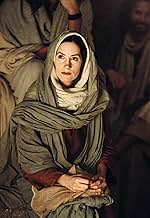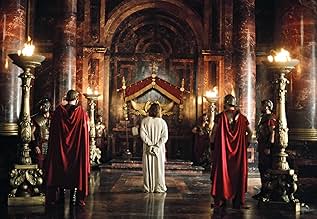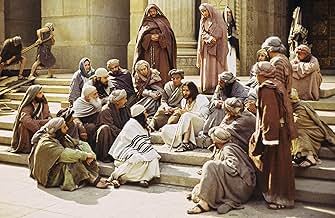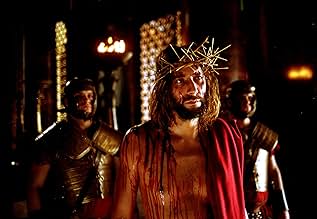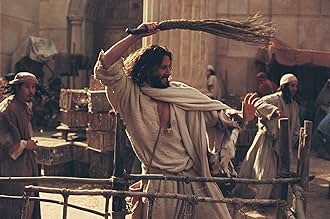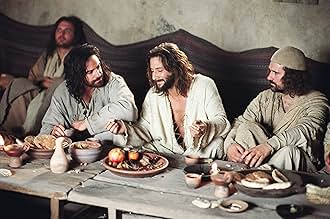Um dos livros mais lidos e amados da Bíblia. Dramaticamente poderoso e arrojado, este filme testemunha Jesus como professor, milagreiro, curandeiro e o homem cheio de compaixão, que fala sob... Ler tudoUm dos livros mais lidos e amados da Bíblia. Dramaticamente poderoso e arrojado, este filme testemunha Jesus como professor, milagreiro, curandeiro e o homem cheio de compaixão, que fala sobre a verdade e a esperança na vida eterna.Um dos livros mais lidos e amados da Bíblia. Dramaticamente poderoso e arrojado, este filme testemunha Jesus como professor, milagreiro, curandeiro e o homem cheio de compaixão, que fala sobre a verdade e a esperança na vida eterna.
- Prêmios
- 1 vitória e 3 indicações no total
- Narrator
- (narração)
- Bridegroom
- (as Paul Nolan)
- High Official #3
- (as Heinar Pillar)
Avaliações em destaque
Many previous films have sampled more than one of the Biblical narratives on the life of Christ. Also, they needlessly added scenes not found in the original sources. The authors of those screenplays in merely sampling from several sources, lost the unique focus of each respective author and diluted the overall effect of the story.
This film is based on John Goldsmith's screenplay which deftly avoids all the laughably silly cliches of previous film versions. Goldsmith's screenplay is based on only one man's perspective, that of Jesus' disciple John. Many stories with which the viewer is familiar, such as the nativity, are missing from John's gospel and therefore also from this wonderfully complex and yet lucid screenplay. Jesus' words are not here presented as pious platitudes, but occur within a context where Jesus responded to those around him.
The dialogue is solely based on the Good News Bible (also known as Today's English Version) Christopher Plummer very ably supplies the verse by verse narration from the same source. His delivery re-enforces the clarity of what is on the screen. Most of the other actors were not known to me--which I felt helped. (What part could one give to an actor who previously portrayed a drug dealer?)
Jesus is brilliantly portrayed by Henry Ian Cusick as Jesus the man with human emotions, Jesus the visionary resented by the religious establishment of his day. This Jesus did not refer to them for his authority. Cusick, convincingly portrays Jesus the carpenter as a handsome, masculine, very charismatic man. Cusick is very much equal to the task. I spoke very briefly with Cusick after the screening, thanking him for his portrayal of a part that is loaded with hazards--all of which he avoided. I hope we see a great deal more of this fine actor.
The music by Jeff Danna is wonderful--well beyond what I could have hoped for.
One friend of mine at the screening expressed his concern that this film in portraying Jesus' death at the hands of the Jewish establishment might make it vulnerable to accusations of Antisemitism. I reassured him that in its earliest days, Christianity was a sect within Judaism. Almost all the people portrayed in The Gospel of John were Jewish. It was not until the destruction of Jerusalem by the Romans in AD 70 that the Christian sect became predominately Gentile.
Director Philip Saville has done an enviable job directing a project that was fraught with artistic traps.
I hope this film receives very wide distribution. Even Christian conservatives should be very happy with it.
For sure, He is not the charismatic figure of `The Greatest Story Ever Told' or `King of Kings,' but Saville makes the miracles pervasive enough to coax anyone, even an atheist or Jew, to pause and ponder the possibility.
Because so many are awaiting Mel Gibson's controversial life of Christ with its alleged hard line about the responsibility of the Jews for Christ's death, Saville's version may be interesting by comparison. Because both films show Jews responsible for Christ's death, there should be no wasted time debating responsibility when discussing the difference in the films. The ruling Romans, Pilate in particular, share the decision to crucify Him as well (The film's preamble asserts that crucifixion was a Roman practice).
The adaptation by John Goldsmith from the American Bible Society's `Good News Bible' is faithful to that 1996 colloquial Bible. The actors' Shakespearean delivery echoes many of the previous filmed versions that substitute gravitas for good acting. But a skeptic has to be enchanted by the simple message and the selfishness of the Pharisees and Romans, even though they are unwittingly fulfilling `God's purpose.'
Played by Henry Ian Cusick, Christ has no extraordinary physical features and no exceptional oratorical skill beyond his few poignant homilies and epigrammatic philosophy. Don't look for the grand pronouncements of the Sermon on the Mount; in fact, his repetitious `I speak the truth' has the opposite effect of creating disbelief in listeners wary when anyone has to declaim this more than once.
Yet, His presence changes things: The agnostic or the Jew must take note of the `teacher's' humanity--he also happens to raise people from the dead and change water into wine. It's in those miracles, emphasized by the film, that the mystery of Christ as the Son of God demands the attention of even the most unmovable agnostic or atheist.
Christopher Plummer's narration, intoned with a bit too much respect, gets laughable as he describes all too obvious actions when they are happening at the same time on the screen (`Christ stood up.'). This is not Pasolini's witty, sensual `Gospel According to St. Matthew.' It is a faithful rendering of the fourth gospel in understandable idioms with a feisty Christ different from the usual pacifist with backlighting.
After all, we do base our calendar on the year of the Lord, so somewhere we must come to terms with the arguably most influential religious figure in history. `The Gospel of John' is a place to start.
It seemed like I was reading the Gospel of John while watching the film. Though the movie was quite long (the gospel account has 21 chapters!),I was never bored.
`The Gospel of John' purports to be a faithful retelling of the fourth gospel. It employs every single word of the text, as rendered by the Good News Bible translation. The film combines dialogue with narration by veteran actor Christopher Plummer. The result is an understandably wordy script. One of my friends used the term `verbose'.
Was it wise or foolish to adopt this approach? That depends on your point of view. It means that the actor playing Jesus must deliver lengthy speeches, especially Jesus' farewell after the Last Supper. This runs the risk of being a deadly bore in cinematic terms. I must confess, I kept nodding off during this segment of the film. To his credit, the director tries to compensate by cutting away to a montage of black-and-white flashback images suggested by Jesus' words. This gives the audience a much-needed visual breather.
On the other hand, and this is a good thing, using the integral text of John's gospel obliges us truly to listen -- to hear the Word. I lost track of how often Jesus said, `I am telling you the truth.' Some might find this annoyingly repetitive. But it certainly hammers home the theme of John's gospel. As if in counterpoint to Pilate's cynical barb, `What is truth?' we have Jesus' ringing declaration, `I am the Truth!' (This is often obscured by older translations, such as `Amen, amen, I say to you'.)
I found `The Gospel of John' highly instructive, not just for what it says, but what is does not say. I realized, for the first time, why John recounts events absent from Matthew, Mark and Luke, while ignoring those familiar to us from their accounts. It struck me that the author of the fourth gospel assumes we are already conversant with all this material. For instance, John does not describe the institution of the Eucharist at the Last Supper, yet abounds in references to bread and wine. Again, John does not tell us what became of John the Baptist (he was beheaded by Herod) or Judas the traitor (he hanged himself). John takes it for granted that we know.
I also realized how often Jesus says, `I am who I am' (three times) and finally, `Before Abraham was, I am.' Jesus applies to Himself the phrase used by Yahweh in the Old Testament as His name. In other words, in John's gospel, Jesus clearly equates Himself with God (`The Father and I are one').
As represented in this film, Jesus is thoroughly human in that He suffers and dies. Yet He also radiates the power of divinity -- not so much in the form of miracles, as in a sense of righteousness, a certainty about His mission. Even Jesus' outrage at the commercialization of Temple worship seems more like the fulmination of an exasperated Old Testament God. We do not see Jesus tempted by Satan or agonizing in the garden of Gethsemane. Jesus knows exactly who He is and what He is doing, even though His followers may not.
The real `stars' of the film are Jesus' opponents, `the Jewish authorities' (Pharisees, Sadducees and scribes) and their hapless instrument, Pontius Pilate. The apostles, on the other hand, are curiously lifeless in this film rendering of John's gospel. Even Judas is given little in the way of motivation. John's explanation is that he was a thief who pilfered the apostles' common purse and sold His master out of simple greed. This explanation may have been enough for the evangelist, but it is far from satisfying in literary or cinematic terms.
The film portrays Mary, the mother of Jesus, as a woman of mature years. Her visual representation comes as something of a shock, compared to Olivia Hussey's incarnation of the Virgin in `Jesus of Nazareth'. I was reminded of Michelangelo's Pietà. Someone pointed out to the sculptor that the mother looked strangely younger than the son. Michelangelo replied that, since the Virgin had been pure and sinless, he could not imagine her aging and decaying. Jesus' mother in `The Gospel of John' thus runs counter to a certain iconographic tradition.
The other women in this film, as in John's gospel, get short shrift. We barely get any sense of Mary Magdalen, or Mary and Martha of Bethany. The most fully developed female character is the Samaritan at the well, played by an actress whose face and voice deliver exactly the right note of hard-bitten cynicism. One only wishes she were not so wild-eyed once she realizes she is speaking to the promised Messiah.
The same excessive theatricality is found in John the Baptist, Nathanael (whom Jesus saw beneath the fig tree before meeting him) and doubting Thomas (whose exclamation, `My Lord and my God!' rings hollow).
A film such as `The Gospel of John' cannot be judged entirely according to the usual canons of cinematic art. In other words, we cannot judge `The Gospel of John' simply on the basis of artistic merit or entertainment value. Ultimately, we must ask: Is the film theologically sound? Does it succeed in conveying the gospel message? How do we, the audience, respond to that message and especially the messenger, Jesus Himself?
In the final analysis -- and this is a question all filmgoers must answer for themselves -- would we heed the Jesus of `The Gospel of John' when He invites us to `Follow me'?
Você sabia?
- CuriosidadesThe dialog follows the Good News Bible, word for word, in sequential order from beginning to end.
- Erros de gravaçãoAfter Jesus performs his first miracle of turning the water into wine at the wedding feast, he pours the wine into what appears to be a plastic cup (to help us see the color of what was water). Actually, colorless glass has been around since approximately the 9th century BC.
- Citações
Jesus Christ: A person who has had a bath needs only to wash his feet; his whole body is clean, and you are all clean, all except one.
- ConexõesFollows O Evangelho de Mateus (1993)
- Trilhas sonorasSymphony No.5
Music by Valentin Silvestrov
Performed by The Ural Philharmonic Orchestra
Conducted by Andrey Boreyko
Produced by Megadisc
Principais escolhas
- How long is The Gospel of John?Fornecido pela Alexa
Detalhes
- Data de lançamento
- Países de origem
- Idioma
- Também conhecido como
- The Gospel of John
- Locações de filme
- Tabernas, Almería, Andalucía, Espanha(Cave scene)
- Empresas de produção
- Consulte mais créditos da empresa na IMDbPro
Bilheteria
- Orçamento
- US$ 10.000.000 (estimativa)
- Faturamento bruto nos EUA e Canadá
- US$ 4.069.090
- Fim de semana de estreia nos EUA e Canadá
- US$ 98.363
- 28 de set. de 2003
- Faturamento bruto mundial
- US$ 4.078.741
- Tempo de duração3 horas
- Cor
- Mixagem de som
- Proporção
- 1.85 : 1
Contribua para esta página





